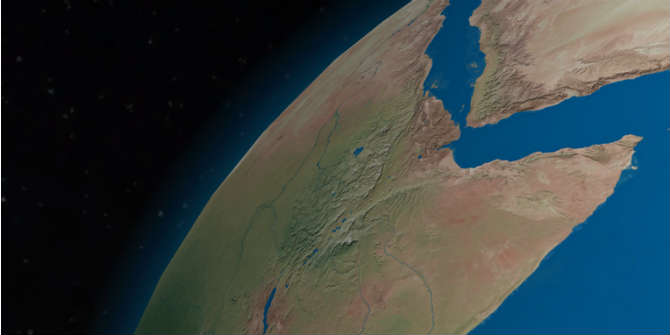Jonah Lipton says that this book is a valuable contribution to the Ebola literature but also key for anyone interested in the state of Africa, epidemiology, and political economy.
Register to hear the editors of this book, Ibrahim Abdullah and Ismail Rashid speak at LSE on Thursday 22 April at 6.30pm, A Preventable Epidemic: The Ebola outbreak and failures of governance in West Africa.
For anyone who even occasionally browsed the news in 2014-15, it was hard not to be aware of West Africa’s Ebola epidemic. Global interest in the virus was fuelled in part by its deadly nature. 11,000 people ultimately succumbed to Ebola across three of the most affected countries: Sierra Leone, Guinea, and Liberia. Unlike in previous outbreaks, the virus hit major urban centres and capitals. In part global attention was underscored by a fear that, if not contained, the epidemic could spread beyond African shores. How did Ebola wreak so much damage? And what lessons can be learnt now that the fog of crisis has cleared?
These are central questions that a new book on the subject, Understanding West Africa’s Ebola Epidemic: Towards a Political Economy, seeks to address. As the title suggests, the answers lie beyond the reaches of biomedical analysis alone. Editors Ibrahim Abdullah and Ismail Rashid rather point us in the direction of the global structures and relations of power that the epidemic mapped itself onto. The inability of state authorities to contain the virus – and the tardy yet ultimately heavy-handed response of the international community – was both historically and structurally conditioned. As they explain, ‘Ebola was not simply a deadly viral disease; it was the manifestation of neoliberalism as an affliction, which wreaks havoc in the world’s most vulnerable societies’. This is an incisive and deeply troubling observation.
The editors of this volume are exceptionally well-positioned to guide the reader through the terrain. Abdullah and Rashid have a wealth of academic experience working in and on Sierra Leone. Many of the contributors hail from across the region, with a mix of backgrounds, from development to disease control. It is fitting then that ‘multi-regionalism’ forms a central overarching theme in the book. The three countries share histories of exploitative relations with the West, from the slave trade to export-driven economies. Post-independence years have been marked by political and civil instability (and war), and economic decline.
A key factor in this recent history were onerous structural adjustment programmes instigated by the IMF and World Bank in the 1980s; initiating an era in which market-based development has been promoted at the expense of state and infrastructural spending. As George Clay Kieh, Jr. outlines in his chapter, Liberia’s transformation into a ‘peripheral capitalist state’ has amounted to a collapse of health and sanitation infrastructure. In 2014, 45 per cent of public health care facilities lacked primary power sources for electricity, and 29 per cent of the population were more than an hour’s walk away from one. Ebola thrived in these conditions, but it did not create them.

A major strength of the book is the detailed and ranging ways in which the relationship between Africa and the international community is interrogated. At one extreme is Chernor Alpha M. Bah’s chapter in which the validity of scientific consensus of zoonotic origins of the Ebola virus is questioned. Bah explores the place of Sierra Leone in American biodefense investment; an uncomfortable type of narrative that is too often, and unproductively, written off as conspiratorial. The chapters in the final section of the book give detailed assessments of some of the transnational actors involved in the crisis response, such as the WHO, UN, and African Union. If histories of international exploitation and neglect in the region is one part of the story, then the heavy-handed humanitarian intervention during the crisis is another. Other contributions to the book highlight important sociological dimensions of Ebola, such as Aisha Ibrahim’s analysis of gender performance, based on the testimonies of four women. The chapter reveals the ways that state failings rendered women disproportionally disadvantaged during the crisis.
As is often the case, in the greatest strength of this book lies a possible weakness. The book’s structural analysis gives its central message authority and usefulness. This is a language that is spoken by students, scholars, and practitioners of international development. Equally, it is an analysis that captures global factors that were too often missing in reportage at the time. Yet – and this no doubt exposes my own disciplinary biases (as a social anthropologist who witnessed the crisis unfold in Freetown) – readers will not necessarily get a flavour of what life during Ebola was really like from the ground up. Nor fully the ways that ordinary people interpreted what was going on around them. This is there in parts, such as the women’s voices in Ibrahim’s chapter, but much of the analysis is far more macro and structural.
This of course is fine, not least because the book’s chief ambition is to forward a political economic analysis. In this the book is successful. It is a commendable and valuable contribution to a growing body of literature on the 2014-15 outbreak, yet one that would appeal to anyone interested in the state of Africa, epidemiology, and political economy more broadly.
Understanding West Africa’s Ebola Epidemic: Towards a Political Economy. Ibrahim Abdullah and Ismail Rashid (eds). Zed Books.
Jonah Lipton (@Jonah_Lipton) is an anthropologist and research officer at the Firoz Lalji Centre for Africa. His research looks at the intersections between African political economy, urban neighbourhood life, crisis, and humanitarianism, with a regional focus on Sierra Leone. His doctoral thesis, based on long-term ethnographic fieldwork immediately before and during the Ebola crisis, examines family life, work, and coming of age among young men in Freetown.
The views expressed in this post are those of the author and in no way reflect those of the Africa at LSE blog, the Firoz Lalji Centre for Africa or the London School of Economics and Political Science.





